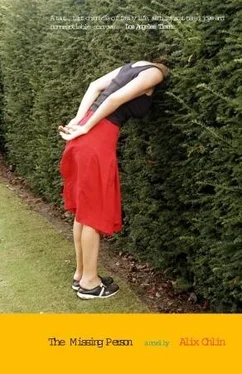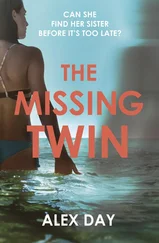I took a clearer look around the apartment. Last time I’d been here, everything was pretty normal: small student desk, small student chair, small student bed. Now the walls were stripped of decoration. There was no furniture anywhere, only sleeping bags and backpacks tucked into corners. A shelving unit against one wall was stacked with wrenches, drills, emergency flares. The place was neat and empty, thoroughly impersonal, like an army barracks.
“So you’re Wylie’s sister? From New York City?” He crossed the room to the kitchen, leaned against the counter and smiled.
“How did you know that?”
He looked me up and down — at my black dress, my black sandals, my black leather purse — and shrugged. “Just a guess.”
“Look, I’m trying to find Wylie. Could you tell me when you saw him last?”
He shrugged again. “Not sure.”
“And you’re not worried about him?”
“Wylie’s a deep thinker,” he said. “He’s grappling with serious issues, and sometimes he needs to be alone.”
“To grapple.”
“That’s what I said, yes.”
There was a weird smell in the apartment — not unpleasant but vaguely acrid, layered, and chemical. I moved a foot or two closer to Boxer Shorts, who was still leaning, pale and shirtless, against the counter. It was coming from him. “I have to go now,” I said.
“Come back anytime,” he said, his broad grin showing very white teeth.
I turned on my heel and left, annoyed. Wylie’d been involved with causes and crusades for years, constantly enrolling in new student groups, petitioning, marching, bouncing from civil rights to homeless rights to animal rights. He could never find the right rights to hold his attention for long. But throughout it all, he’d never gone so far as to disappear.
I was unlocking the Caprice when I heard a voice shout, “Wylie’s sister! Wylie’s sister!”
Boxer Shorts, in his white chest and holey jeans, was running down the building’s stairway. He ran like a soldier, his back rigid, knees high in the air; and although he was going pretty fast, he stopped on a dime in front of me and wasn’t even out of breath.
“People usually call me Lynn,” I told him.
“I didn’t know,” he said. “My name’s Angus Beam.”
We shook hands and stood there for a second, looking at each other, me smelling his weird, chemical scent.
“Was there anything else?”
“There’s a meeting tonight, here, of our group,” Angus said. “I thought you might want to come. Meet Wylie’s friends. See what we’re about.”
I nodded and thanked him, then got into the car. He stood there in the parking lot and watched me back out, which made me uncomfortable. Before hitting the street I rolled down the window and asked, “What are you about, anyway?”
“The meeting’s at nine,” he said, and waved.
After Wylie’s I dropped by the campus to look for him in the biology and philosophy buildings: a long shot, but I felt I should check anyway. It was strange to hear my footsteps echoing in another set of academic hallways, these ones decorated with fake pueblo accents. I found myself walking into the library, where I stepped to a terminal and typed in, by habit, my father’s name.
Fleming, Arthur: The Temporal Dimension in Physics. It was his doctoral dissertation, and only published work, which had sat on a shelf at home. In the acknowledgments he thanked my mother, who was then his fiancée, for all her help, support, and typing, and as a child I’d been fascinated by that; it was hard for me to grasp the idea that my parents had once been students together, living in a one-bedroom apartment in Chicago, drinking wine late at night, my father watching over my mother’s shoulder as she turned his scrawled notations into typescript. What did they look like then? What did they say to each other? The vision was magnetic yet alien, like life on another planet. I’d thought that one day it would come into focus; in the same way, I’d always assumed that eventually I’d be able to read the whole book, decipher its diagrams and equations, resolve it into meaning just as I was learning to read harder, longer words as I got older.
But this never happened. As a teenager, I decided I wasn’t interested in science. I didn’t like math and especially hated physics, and my father’s job was some unknown, boring thing he did for the government in a windowless office. The fact that he was a scientist was one of my many grievances against him, not because he was involved in anything sinister— although for all I knew, he was; I really had no idea what he did at work all day, and often into the night — but because of his scientist’s geekiness, the knee socks he wore with shorts, his taupe-colored shirts that never seemed to fit right, the way he sometimes talked with his mouth full, all his embarrassing habits that potentially incriminated my own awkward teenaged self. After I graduated from high school and left home, this attitude mellowed, and I might even have got around to asking him about his work. Now there seemed no point. Yet it pleased me to think of him living on in the screen’s digital glow, almost as much as the yellowing copy of the book itself in the stacks.
At noon I headed downtown to my mother’s office. Around me sunlight glinted off lowrider fenders, cholos staring out from behind the steering wheels, their music pounding down the streets. Farther west, slender shadows bordered the boxy, old-fashioned buildings of the tiny business district.
Inside Worldwide Travel, the air was conditioned to a glacial level, and I had to stand still for a second just to readjust. Sweat cooled to ice on my skin. My mother was in her office explaining something to a large, burly man with an equally burly mustache. I sat down in the carpeted lobby underneath a poster of Greece, a bone-white beach against the turquoise Aegean, and waited for her to finish with her customer. I could hear their voices but not what they were saying. Francie Garcia, my mother’s partner, sat talking on the phone behind the glass door of her office. Other phones rang distantly, were answered, rang again.
Francie came rushing out, jiggling car keys and smiling mechanically at the top of my head. “Someone will be with you in a moment,” she said, and then, “Lynn!”
“Francie, how are you?”
She smiled. She was in her late forties but looked younger, with long, curly hair and circles under her eyes. For reasons I never understood she always wore bright blue eye shadow.
“Well, I’ll tell you, honey,” she said, shaking her head and tucking the keys into her large black purse. “At least I have my health.” She said this all the time.
“That’s good, Francie.”
“And how’s life in the big city?”
“It’s all right.”
“You should come by and see Luis while you’re here. He’d love to hear all about New York.” Luis was her son, and around my age. During high school we’d had one disastrous, parentally induced date. “He’d love to see you.”
“How is Luis? Is he married?” This was how I pictured everyone I knew from high school who’d stayed in Albuquerque: living in a prefab house in one of the new West Mesa suburbs, with a brood of children playing on a swing set stuck crookedly into the rock lawn. It was unfair to generalize, but on the other hand, it was generally true.
Francie threw me a sideways look. “Luis? No. I don’t think he’ll ever settle down.”
I wondered what not settling down implied about someone who’d lived in the same town, surrounded by his entire family, for his entire life.
“Listen, honey, your mom’s waiting for you with her friend, so I’ll let you go.” She kissed me on the cheek and left.
Читать дальше












